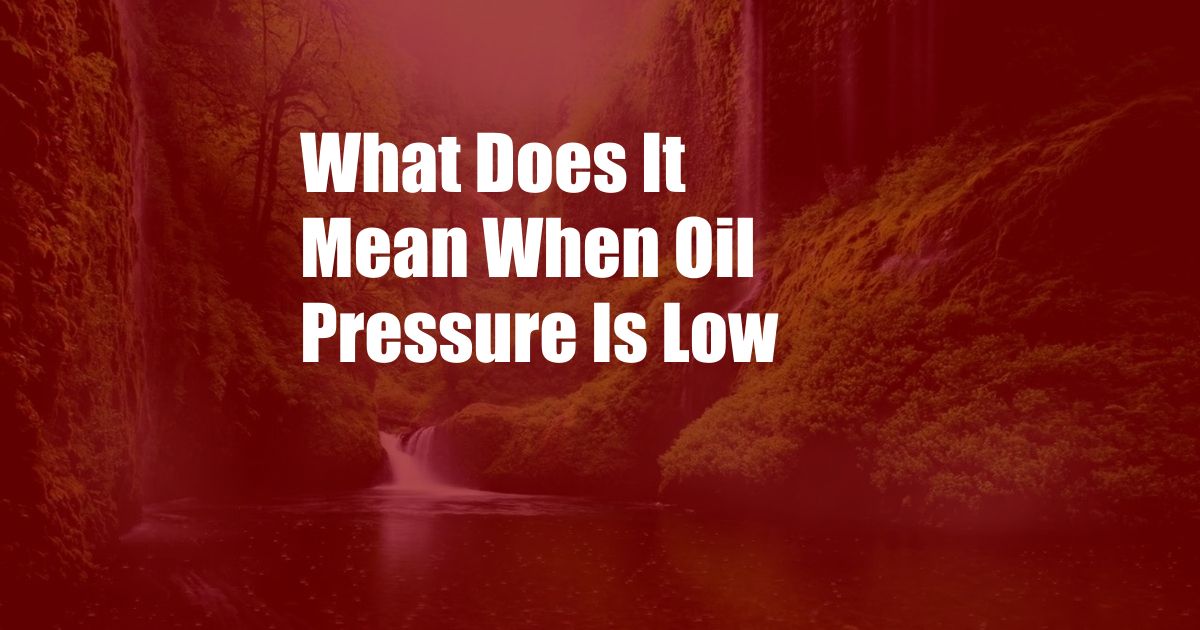
What Does It Mean When Oil Pressure Is Low?
I was driving home from work one day when my car started to make a strange noise. It was a rattling sound that seemed to be coming from the engine. I pulled over to the side of the road and checked under the hood, but I couldn’t see anything wrong. I started the car back up and the noise was still there. I decided to drive it to the nearest auto repair shop to have it checked out.
The mechanic told me that my oil pressure was low. He said that this could be caused by a number of things, including a leak in the oil pan, a faulty oil pump, or worn-out bearings. He also said that low oil pressure could lead to serious engine damage if it’s not fixed right away.
What is Oil Pressure?
Oil pressure is the force exerted by the oil pump to circulate oil throughout the engine. It is measured in pounds per square inch (psi). The ideal oil pressure for most vehicles is between 20 and 60 psi. If the oil pressure is too low, it can cause the engine to overheat and seize up.
Causes of Low Oil Pressure
There are a number of things that can cause low oil pressure, including:
- Oil leaks
- Faulty oil pump
- Worn-out bearings
- Clogged oil filter
- Low oil level
Symptoms of Low Oil Pressure
There are a number of symptoms that can indicate low oil pressure, including:
- Engine noise (rattling or knocking)
- Oil pressure warning light
- Low oil level on the dipstick
- Overheating engine
- Engine seizure
How to Fix Low Oil Pressure
The first step in fixing low oil pressure is to identify the cause. Once the cause has been identified, it can be repaired or replaced. In some cases, simply adding oil to the engine may be enough to fix the problem.
If you are experiencing any of the symptoms of low oil pressure, it is important to have your vehicle checked out by a mechanic as soon as possible. Low oil pressure can lead to serious engine damage if it’s not fixed right away.
Tips and Expert Advice for Maintaining Proper Oil Pressure
Here are a few tips and expert advice for maintaining proper oil pressure:
- Check your oil level regularly and add oil as needed.
- Change your oil and oil filter according to the manufacturer’s recommendations.
- Use the correct type of oil for your vehicle.
- Avoid driving your vehicle if the oil pressure warning light is on.
- Have your vehicle inspected by a mechanic if you are experiencing any of the symptoms of low oil pressure.
By following these tips, you can help to maintain proper oil pressure and keep your engine running smoothly.
FAQs About Low Oil Pressure
- What is the ideal oil pressure for most vehicles?
The ideal oil pressure for most vehicles is between 20 and 60 psi. - What are the symptoms of low oil pressure?
The symptoms of low oil pressure include engine noise (rattling or knocking), oil pressure warning light, low oil level on the dipstick, overheating engine, and engine seizure. - What should I do if I am experiencing symptoms of low oil pressure?
If you are experiencing symptoms of low oil pressure, it is important to have your vehicle checked out by a mechanic as soon as possible. - Can I drive my vehicle if the oil pressure warning light is on?
No, you should not drive your vehicle if the oil pressure warning light is on. Driving with low oil pressure can lead to serious engine damage. - How can I prevent low oil pressure?
You can prevent low oil pressure by checking your oil level regularly and adding oil as needed, changing your oil and oil filter according to the manufacturer’s recommendations, using the correct type of oil for your vehicle, and avoiding driving your vehicle if the oil pressure warning light is on.
Conclusion: The Importance of Maintaining Proper Oil Pressure
Oil pressure is essential for the proper functioning of an engine. Low oil pressure can lead to serious engine damage, so it is important to be aware of the symptoms and causes of low oil pressure.
If you are experiencing any of the symptoms of low oil pressure, it is important to have your vehicle checked out by a mechanic as soon as possible. By following the tips and expert advice in this
article, you can help to maintain proper oil pressure and keep your engine running smoothly.